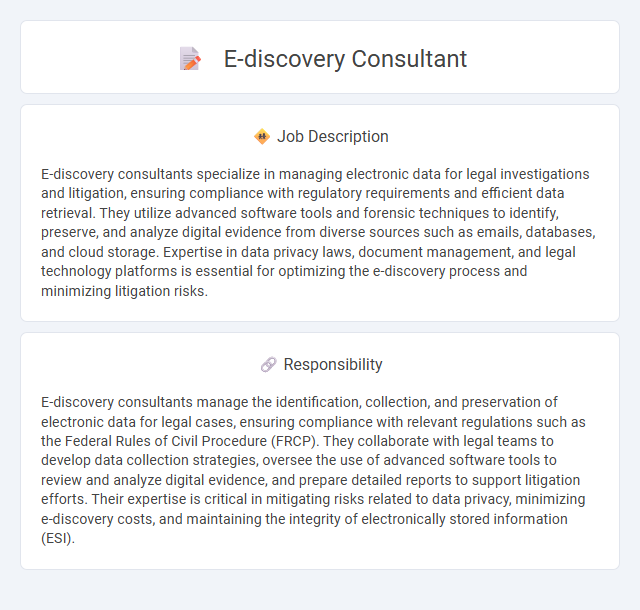
E-discovery consultants specialize in managing electronic data for legal investigations and litigation, ensuring compliance with regulatory requirements and efficient data retrieval. They utilize advanced software tools and forensic techniques to identify, preserve, and analyze digital evidence from diverse sources such as emails, databases, and cloud storage. Expertise in data privacy laws, document management, and legal technology platforms is essential for optimizing the e-discovery process and minimizing litigation risks.
Individuals with strong analytical skills and a solid understanding of legal and technical processes are likely to be well-suited for an E-discovery consultant role. Those comfortable working with large datasets, technology tools, and managing deadlines may find this job fulfilling and aligned with their strengths. People who prefer dynamic problem-solving environments and have attention to detail are probably more inclined to succeed in this position.
Qualification
An E-discovery consultant must possess expertise in electronic data management, legal technology, and information governance, with familiarity in tools like Relativity, Concordance, or Clearwell. Strong analytical skills, knowledge of legal procedures, and experience in managing data retrieval, processing, and review are essential. Proficiency in data privacy regulations, project management, and communication with legal teams enhances effective e-discovery outcomes.
Responsibility
E-discovery consultants manage the identification, collection, and preservation of electronic data for legal cases, ensuring compliance with relevant regulations such as the Federal Rules of Civil Procedure (FRCP). They collaborate with legal teams to develop data collection strategies, oversee the use of advanced software tools to review and analyze digital evidence, and prepare detailed reports to support litigation efforts. Their expertise is critical in mitigating risks related to data privacy, minimizing e-discovery costs, and maintaining the integrity of electronically stored information (ESI).
Benefit
E-discovery consultants likely provide significant benefits by streamlining the electronic discovery process, reducing legal risks, and minimizing costs associated with litigation. Their expertise in managing data collection, analysis, and compliance probably improves case outcomes and ensures regulatory adherence. Employing an e-discovery consultant may increase efficiency and accuracy in handling vast volumes of electronic evidence.
Challenge
E-discovery consultants likely face the challenge of navigating vast amounts of electronic data to identify relevant information efficiently while ensuring compliance with legal standards. The complexity of evolving technology and varying regulatory requirements may require constant adaptation and specialized expertise. Managing tight deadlines and maintaining data security might also contribute to the demanding nature of this role.
Career Advancement
E-discovery consultants with expertise in data management, legal technology, and compliance analytics experience accelerated career advancement opportunities within law firms, corporations, and consulting agencies. Mastery of e-discovery platforms such as Relativity, Clearwell, and Nuix enhances prospects for leadership roles, including project manager and senior consultant positions. Continuous professional development through certifications like Certified E-Discovery Specialist (CEDS) significantly boosts career growth and salary potential.
 kuljobs.com
kuljobs.com